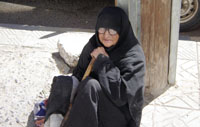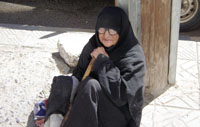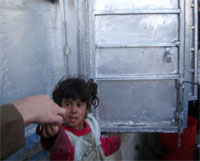
Poverty attacking from all sides [Archives:2006/925/Reportage]
March 2 2006
 |
 |
hakim_almasmari@hotmail.com
During the late '80s and early '90s, a middle class existed in society, but unfortunately, today, many of those families have dropped and joined lower class citizens. The latest UN report on Yemen revealed that nearly 17 percent of the population lives below the poverty line, which is an average of $1 per day. These numbers do not reflect those living near the poverty line, as figures could rise to nearly 40 percent of the total population. International observers are noticing a shift in tone in Yemen's political agenda, as it seemingly is heading backward, while authorities are not doing enough to prevent the country from future droughts and possible full-fledged catastrophe.
Despite its location in the oil-rich Middle East, Yemen remains one of the poorest world nations, according to the World Bank. Ongoing efforts to reduce poverty often are heard of, but until now, no positive progress has been noticed. Oil fields are drying out, water resources are vanishing and poverty rates are reaching unbearable figures. Unemployment was at 35 percent two years ago, whereas it now has risen to 37 percent, according to the annual UN report.
Unemployed university graduates have reached unimaginable numbers, while those occupying jobs in some situations rarely get $1 an hour! Illiteracy rates are nearing 50 percent and a whopping 87 percent among poor and lower class citizens. “I finished my university studies, hoping only for a chance at a better future. I realized I have wasted my life seeking education, as no value whatsoever is given to knowledge,” said Ameera Ali, who completed her masters in education and now works as a low paid secretary.
Older citizens without family to support them have no other choice but to beg or live on the streets. Around the country, no government senior citizen homes exist for society's elderly, if needed. The cities of Hodeidah, Taiz and Aden have such homes but they are not run by the government and are funded by local businessmen or foreign governments. As a result, service is limited, leaving older people to suffer life's disasters on their own.
The World Health Organization mentioned that 80 percent of drinking water in rural areas across Yemen are unsafe, making it easier to contract numerous diseases. “How do you expect a county to prosper if basic life essentials are not available for the people? Citizens in most Arab countries enjoy a life full of opportunities, while here in Yemen, people's living standards worsen as years pass,” said Samia Abdul Nasser, whose family of six has suffered years of poverty, with a household income of only $70 monthly.
Naila Sabra, UN World Food Program (WFP) representative for Yemen, mentioned that poverty has increased dramatically in the past two years, as officials are not giving poverty great concern. She said, “Most funds are being spent on construction and do not reach the poor.”
According to Transparency International, an institution revealing corruption around the world, Yemen was rated number 106, making it one of the most corrupted nations in the world. Such results are not new to many citizens, as they understand that corruption is the root of the country's heading backwards. “It just doesn't make any sense,” said No'man Homadi, a local citizen working for a $2 per day salary. “Every citizen clearly understands that corruption in government circles is key in this destructive phenomenon,” he added.
In the late 1980s, the northern government promised to spread prosperity throughout the country, while vowing to introduce a unique natural gas project allowing natural gas flow to reach citizens' houses without the hassle of buying a gas tank. The conclusion? The majority of citizens don't have appropriate electric or even sewer systems up until now, not to mention the promised natural gas project. Basic essentials still are seriously lacking in this oil-rich Middle Eastern country.
In many neighborhoods around the capital, homeless families are seen sleeping on curbs and in cardboard houses, leaving them no other choice but to freeze during the cold season. “If you would like to see how widespread poverty has become in Yemen, visit the streets of Nukum zone in Sana'a. There you will see the poor living on the streets with no one caring for them or giving them a loving heart,” said Nukum zone resident Mansour Saleh. “Life has changed for many families and the situation is only getting worse,” he added.
In the early 1990s, Yemenis in general did not expect life to be as difficult as seen today, with the poverty rate increasing annually. The latest Transparency International report mentions Yemen as one of the eight most corrupt nations. It also mentions that the gross domestic product (GDP) per Yemeni citizen ranked a whopping 211th out of 226 total nations.
Government officials must understand the problem's scale in order to solve it. No effort is noticeable in stopping such an ongoing dilemma, as if the issue deserves no importance whatsoever. Tensions, disagreements and emotions during this period are far more dangerous than at anytime in the past. People have lost patience and will resort to unlawful solutions to ease their problem.
“I don't know what to do if my family needs medical attention. What am I supposed to do to help them? Resorting to unlawful actions is the only solution in this crucial situation,” said 57-year-old Nagi Abdu Rabu Mohsen, father of seven homeless children living on a Sana'a street corner. “This life was destined for me and my family,” he concluded.
——
[archive-e:925-v:14-y:2006-d:2006-03-02-p:report]


